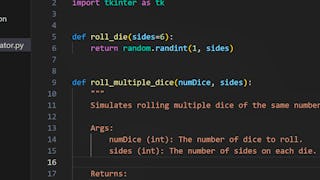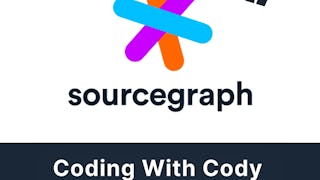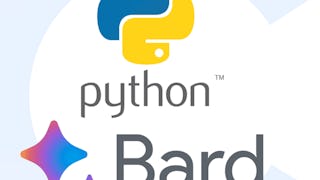- Browse
- Pseudo Code
Results for "pseudo-code"
 Status: Free TrialFree Trial
Status: Free TrialFree TrialSkills you'll gain: Software Design Patterns, Computational Thinking, Software Design, Algorithms, Program Development, Software Development, Data Structures, Problem Solving, Computer Science, Machine Learning Methods
Advanced · Course · 1 - 4 Weeks
 Status: Free TrialFree Trial
Status: Free TrialFree TrialSkills you'll gain: Maintainability, Code Review, Testability, Debugging, Style Guides, Software Documentation, Software Design Patterns, Programming Principles, Quality Assurance
4.9·Rating, 4.9 out of 5 stars9 reviewsIntermediate · Course · 1 - 4 Weeks
 Status: FreeFree
Status: FreeFreeSkills you'll gain: Version Control, Debugging, Microsoft Visual Studio, Integrated Development Environments, Software Development Tools, Development Environment, Software Development
3.6·Rating, 3.6 out of 5 stars7 reviewsIntermediate · Guided Project · Less Than 2 Hours
 Status: FreeFree
Status: FreeFreeSkills you'll gain: Debugging, Development Environment, Open Source Technology, Integrated Development Environments, Software Development Tools, AI Workflows, Software Engineering, Application Development, Javascript
Intermediate · Guided Project · Less Than 2 Hours

Skills you'll gain: Prompt Engineering, Generative AI, Development Environment, Computational Thinking, Program Development, AI Enablement, Software Development, Python Programming, Game Design, Debugging
4.1·Rating, 4.1 out of 5 stars11 reviewsBeginner · Guided Project · Less Than 2 Hours

Skills you'll gain: Maintainability, Code Review, Software Architecture, Software Design, Object Oriented Design, Debugging, Testability, Programming Principles, Scalability
Intermediate · Course · 3 - 6 Months
 B
BBoard Infinity
Skills you'll gain: Continuous Integration, Debugging, Software Development Tools, Software Engineering Tools, Performance Tuning, Performance Testing
Intermediate · Course · 1 - 4 Weeks

Skills you'll gain: Responsive Web Design, No-Code Development, Web Design, Content Management, Web Design and Development, Web Content, Web Development
4.4·Rating, 4.4 out of 5 stars131 reviewsBeginner · Guided Project · Less Than 2 Hours
 G
GGoogle Cloud
Skills you'll gain: Terraform, Infrastructure as Code (IaC), Cloud Infrastructure, Cloud Management, Google Cloud Platform, Cloud Deployment
4.9·Rating, 4.9 out of 5 stars34 reviewsBeginner · Project · Less Than 2 Hours
 Status: PreviewPreviewM
Status: PreviewPreviewMMathWorks
Skills you'll gain: Image Analysis, Matlab, Computer Vision, Medical Imaging
Beginner · Course · 1 - 4 Weeks
 Status: Free TrialFree Trial
Status: Free TrialFree TrialSkills you'll gain: Pseudocode, Computational Thinking, Debugging, Algorithms, Programming Principles, Front-End Web Development, Javascript, Computer Programming, Data Structures, Web Development
4.6·Rating, 4.6 out of 5 stars36 reviewsIntermediate · Course · 1 - 4 Weeks
 Status: Free TrialFree Trial
Status: Free TrialFree TrialSkills you'll gain: Infrastructure as Code (IaC), AWS CloudFormation, Terraform, CI/CD, Prometheus (Software), Continuous Integration, Amazon Web Services, Grafana, Continuous Deployment, System Monitoring, Cloud Infrastructure, DevOps, Cloud Deployment, Infrastructure Architecture, Continuous Monitoring, Query Languages
Intermediate · Course · 1 - 4 Weeks
Searches related to pseudo-code
In summary, here are 10 of our most popular pseudo-code courses
- Data Structures and Algorithms: Merge Sort: Scrimba
- Clean Code Basics: How to Write Maintainable Code: Scrimba
- VSCode for Developers: Set up a professional environment: Coursera
- Coding With Cody Sourcegraph: Optimise Open Source Code: Coursera
- Gen AI for Software Development: Code Generation for Python: Coursera
- Writing Clean Code: 20 Code Smells & How to Avoid Them: Packt
- Effective Code Review Practices: Board Infinity
- Create a no-code responsive website with Webflow: Coursera
- Infrastructure as Code with Terraform: Google Cloud
- Low Code Image Segmentation: MathWorks










